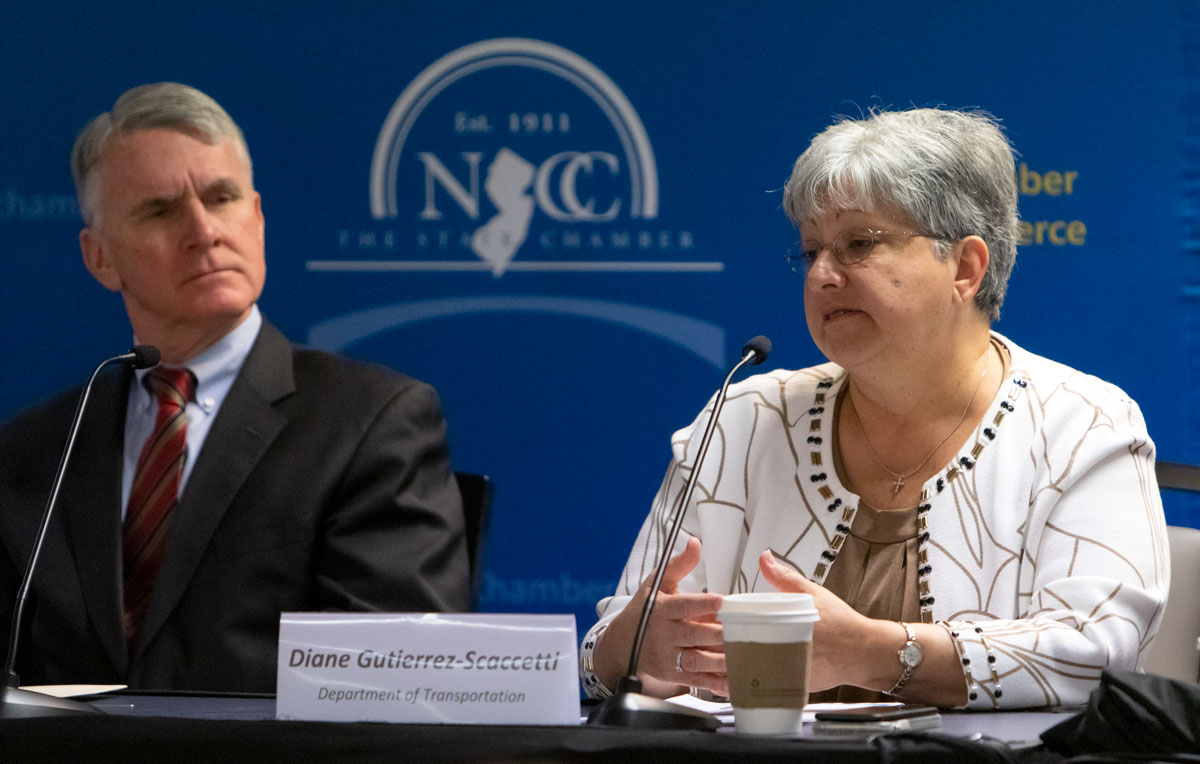As president and CEO of NJ Transit, Kevin S. Corbett is in the line of fire for the bus and rail agency’s well-documented on-time and reliability issues. “We get beat up and rightly so at times,” Corbett said.
“A lot has changed and is getting better,” added Corbett, who was appointed in February 2018 to lead one of the nation’s largest statewide public transportation systems. “On-time performance is improving, but we have a long way to go.”
Corbett and New Jersey Department of Transportation Commissioner Diane Gitierrez-Scaccetti were guests at a breakfast roundtable on Nov. 12 that was presented by the New Jersey Chamber of Commerce and NJBIA.
“I will argue with you all day that NJ Transit is on the trajectory to become the agency it once was,” said Gitierrez-Scaccetti, who also took her office in early 2018.
Together, Corbett and Gitierrez-Scaccetti are working to maintain and modernize the state’s transportation infrastructure.
Among NJ Transit’s progress, Corbett said:
- Crops of new train engineers are coming up the ranks. Seven engineers recently graduated and eight more future classes are working their way through engineering and train pilot programs, Corbett said. “This will give us the capacity for additional services.”
- NJ Transit brought on 600 new bus drivers which will bring a half million more bus seats this year.
- NJ Transit purchased 150 new train cars to replace many of its cars that are more than 40 years old. However, he noted that it will take four years to get the cars, due to order lead times.
- The agency has purchased more than 200 new buses.
- The agency has hired 1,700 new employees, and among their focus areas is better communications with riders.
“I was surprised when I arrived that we did not have a five year capital program,” Corbett said. “We are working on one with a focus on repair followed by what is needed to meet future demand.”
Among the agency’s current challenges is meeting the Jan. 1, 2021 federal mandate to install Positive Train Control, a system designed to improve railway safety. The mandate “requires a lot of manpower - a lot of testing, a lot of engineers and test trains,” Corbett said. “And that (has affected) our performance metrics.”
As for roads, much of the money from the state’s renewed Transportation Trust Fund has been invested in local projects over the past two years, including $450 million in local projects last year, Gitierrez-Scaccetti said.
State projects will be ramped up this year, she added, with a budget for $900 million, not including toll roads and NJ Transit.”
She cautioned that transportation is not just roads. “We have to stop looking at infrastructure as just roads or just trains or just buses,” Gitierrez-Scaccetti said. “If one thing doesn’t work, nothing works well. We can’t work in silos.”
She added, “You can’t travel from Boston to Washington without traveling through New Jersey. Whether by train, Turnpike or Route 295, we need to make people feel safe and make people feel comfortable that they have the services they need.”
Another objective at the DOT is to improve the permitting process, the commissioner said.
“In Florida, you can build a Wawa in one year. In New Jersey, you can’t get permits in one year,” Gitierrez-Scaccetti said. “My goal is to ask, 'How can we help improve the process to make business feel they are being heard.'”
“Change is like turning a battleship,” she added. “But we can change.”
